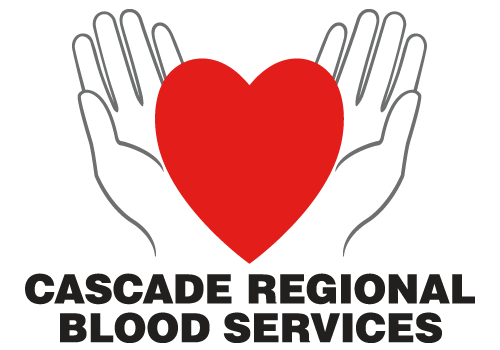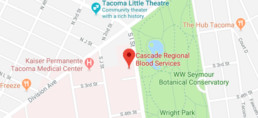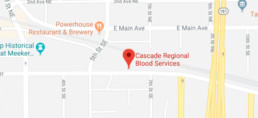
“CRBS is like family to me.”
Without donations for her Total Plasma Exchange treatments, Serina would have a very slim chance of survival. Thanks to your generous plasma donations and the caring staff at CRBS she gets a chance to live up to her blood type, B Positive.
My name is Serina Clark. I am in my late 20s and I have been battling with a rare blood disorder called Thrombotic Thrombocytopenia Purpura (TTP) since late 2014. My disease it what is known for me as idiopathic meaning that medical professionals are not sure why this blood disorder keeps reoccurring.
Some of the symptoms that I experience when I feel TTP coming on are severe heart palpitations, lightheadedness, shortness of breath and nausea.
I receive wonderful medical treatment, both inpatient and outpatient at Tacoma General Hospital. The type of treatment that I receive is called Total Plasma Exchange (TPE), and is what we like to call an “oil change”, meaning my plasma is taken out and is replaced with donor plasma.
I have received TPE treatments on and off again for about three years. I have had over 70 TPE treatments, 2 units of platelets, 9 units of red blood and close to 500 units of plasma from 2014 through 2017.
I am very fortunate that TTP is treatable and after usually going through about a month or two of treatment I am able to gradually regain my life back.
The nurses from CRBS are some of the most kind and selfless people I have ever met in my life and I consider the entire CRBS organization a part of my family. I know that CRBS could not do the outstanding work that they do without the help of the AMAZING donors! Blood donors who take time out of their day to give blood means the world to me because without plasma donations for my TPE treatments, I would have a very slim chance of survival.
I would like the donors to know that every day I try to live up to my blood type, B positive, because I’ve learned life is too short not to. I want people to know that good can come out of what may seem like a difficult or even an impossible situation. If it had not been for my disease I would have never had the opportunity to meet the wonderful nurses, staff, or donors of CRBS. From the bottom of my heart I am truly thankful to the entire CRBS organization and to all of their generous donors.
“He can play sports again.”
Thanks to your blood donations, Isaiah can control his sickle-cell anemia and enjoy the childhood he deserves.
“Our little Isaiah was born on September 25, 2009 and was diagnosed with sickle cell anemia one month later. Our baby was first hospitalized at three months old, and since then has spent more than 1,000 days in Mary Bridge Children’s hospital and has undergone six blood transfusions and constant therapy for his acute chest syndrome.
Sickle cell disease is a group of disorders that affects the hemoglobin in the blood. Although the severity of symptoms varies, Children like Isaiah who suffer from sickle cell have repeated infections and periodic episodes of pain. Some may have mild symptoms, while others like Isaiah are frequently hospitalized for more serious complications, due to the shortness of breath, fatigue, and delayed growth and development in children Anemia can cause.
Of course, for our Isaiah this is most difficult because of his love of basketball. The rapid breakdown of red blood cells causes painful episodes when sickled red blood cells, which are stiff and inflexible, get stuck in small blood vessels. These episodes deprive tissues and organs of oxygen-rich blood and can lead to organ damage, especially in the lungs, kidneys, spleen, and brain. This experience has changed our lives dramatically and in order to decrease the chances of a crisis I make sure he eats less fatty foods and more veggies, while I try to keep him active and fully hydrated.
If I were to encounter someone going through this same situation, I would encourage them that all is not lost and there is still hope. Do not give up and do not give in. Some nights may seem darker than others, but remember that the sun always shines in the morning. Enjoy the present and do not be consumed by the future, and believe that God has greater plans for your child.
To the staff and nurses with Cascade Regional Blood Services, I would like to say thank you so much from the bottom of my heart! Because of the outstanding job you do daily I am able to hold my child in my arms day in and day out, and even though our journey is not over, I know without a doubt that I can trust the staff and nurses to do their job correctly.
To anyone who is debating donating blood, your donation can save a life and it will cost you nothing. Without your donation, it can cost a family a loved one and no one wants to lose someone that they cherish. Take a moment to reflect if your mother, father, sister, brother, aunt, uncle, cousin, grandmother, grandfather, son or daughter were in need you would want someone to be selfless and donate. It may not go to someone you know, but just know that your sacrifice is not going unnoticed.
To anyone reading this, continue to encourage your peers to donate. It doesn’t have to be hip or cool because saving a life is worth so much more. Because of your donations I am able to watch my son play sports that he enjoys and seeing the smile on his face brightens any dark day I have in life.
Thank you so much for the opportunity to share my story and my feelings.”
Charnelle
Isaiah’s mother


“She’s a spunky, silly, healthy six-year-old”
Born four weeks early, at less than two pounds, Callie was the smallest of her triplet sisters. A blood transfusion gave her the strength to survive. Thanks to your blood donations she’s thriving and, according to her mother, gets sick less often than her sisters.
“Our triplets were born at 32 weeks gestation, with Callie weighing less than 2 pounds due to severe intrauterine growth restriction (IUGR). After a few weeks in the NICU at Tacoma General Hospital her liver began to shut down due to lack of body fat. She was extremely jaundiced and the outlook was not positive.
The doctor recommended a blood transfusion but I had a lot of concerns. Here was my very fragile newborn and I knew next to nothing about blood transfusions or the process. Once the nurses sat me down and explained the process that Cascade goes through to screen and ensure the safety of each donation, I felt much more confident.
Within 24 hours my little girl was a completely different baby! Where she had been yellow and lethargic, she was now a healthy pink, and alert. After one more transfusion her body was able to focus on other factors with her health.
Now, Callie is a happy and healthy 6 year old, who only gets sick about 2/3 of the time her sisters do and recovers twice as fast! After going through the blood transfusion process it would not surprise me if it was because of the transfusion.
I cannot thank the Cascade Regional Blood Services staff and donors enough. It is because of what they do that my little girl is alive today. Being a first time mom is scary and have a baby born sick can make that even more emotional. I feel beyond blessed and grateful that Callie was able to receive the transfusion and that it was from a source that is so trusted.
To other parents in a similar situation; I know it can be hard to accept that your baby needs help that you can’t give them, but on this side of the procedure my only wish is that I could have had it done sooner.
There is probably a lot I could say on an emotional level, but honestly, the best way for me to explain what a gift a blood donation is, and centers like Cascade Regional Blood Services are, is looking at before and after pictures of Callie’s first blood transfusion. The pictures speak for themselves.”
Nicole
Callie’s mother
“I was able to breathe again.”
At just 47 years old, Michael was in stage four heart failure. His lifesaving surgery was made possible with your blood donations.
As Michael Fournier dropped his youngest child off at Central Washington University to start her freshman year of college last fall, he felt even more emotional than most parents in the same circumstance.
“I didn’t know if this was the last time I was going to see her,” he recalls. “That’s a scary thought.”
At just 47 years old, Fournier was in stage 4 heart failure and quickly running out of options to stay alive.
“As a cancer survivor I wasn’t eligible for a heart transplant and I wasn’t going to make it much longer,” he says.
Fournier underwent a quadruple bypass about seven years prior and last year thought he needed a stent because he was having trouble again. Doctors agreed and placed a stent, “but something still didn’t seem right,” he says. So they sent him to the Heart Failure Clinic at MultiCare Good Samaritan Hospital in Puyallup. After running some tests, they determined his heart was only pumping at 23 percent of normal efficiency and referred him to the VAD program at Tacoma General.
Not so long ago, he would have been faced with no real chance of long-term survival. But today, he’s not just alive but also enjoying life again thanks to a ventricular assist device, or VAD, surgically implanted at MultiCare Tacoma General Hospital and the blood donations from Cascade Regional Blood Services that helped him survive surgery.
The VAD is a mechanical pump that takes over the function of the left side of the heart. Originally used as a “bridge to transplant” or “bridge to recovery” to keep patients alive long enough to receive heart transplants or recover heart function, Pulse Heart Institute offers VAD implants as “destination therapy” for patients like Fournier who will live with the VAD for the rest of their lives.
Patients with serious heart problems like Michael often require surgery and the need for donated blood products can be life or death. Although there are a handful of effective methods surgeons can use to recycle and/or contain a patient’s own blood, the delicate nature of cardiovascular procedures can easily result in the need for donated blood, typically requiring between 2-25 units. Without the selfless efforts of blood donors, patients with complications during surgery would have very little chance of survival.
After surviving cancer and getting a new life from a high-tech heart implant, Fournier says he isn’t too worried about the future.
“If I can get several more years, by then, who knows what we’ll have?” he says.

Blood Donors Save Lives
Someone needs blood every two seconds in the United States. The only way to get the blood needed is from a volunteer blood donor. Here are some stories about how blood donors save lives.
In September 2014, Serina Clark became severely ill at work and was taken to Tacoma General Hospital. She was admitted to the hospital with a rare and life-threatening blood disorder called “Thrombotic Thrombocytopenia Purpura” (TTP). She was in the hospital for 5 weeks and underwent a series of Therapeutic Plasma Exchanges conducted by CRBS nurses while hospitalized. Serina is a true testament as to how blood donors truly do save lives. In this video, Serina and Jeannie Neilsen share her journey back to health.
In May 2012, shortly before graduating from Cascade Christian High School, Sarah was in a near-fatal car accident. This is the story of how blood donors saved her life.
Bob, an active member of the Pierce County community, began to experience chest pains at work on Sept. 15, 2011. He quickly found himself at St. Clare Hospital receiving treatment for a ruptured aorta. While his family prayed and waited, Bob underwent hours of surgery. During two surgeries that lasted more than 21 hours, Bob received 42 units of blood. This is the story of how blood donors saved his life.
After five years of marriage, Laura and Pat Jenkins were expecting their first child. While giving birth to their daughter, Dawn, Laura required 10 units of O-Negative blood. With the blood supplied by CRBS and the expertise of the staff at St. Joseph Hospital, Laura survived.
Pat, Laura and Dawn currently live in Puyallup. She and her family are extremely grateful to their community for helping save her life. See her story here.
Mary Young, a busy wife, mother and grandmother, went to the doctor in 2005 for a routine exam. She was not expecting that exam to turn into a diagnosis of multiple myeloma, cancer of the plasma cells. As part of her treatment, Cascade Regional Blood Center collected, processed and stored her healthy peripheral blood stem cells for transfusion. Mary received a stem cell transplant to infuse healthy cells into the body with the goal of those cells overtaking and replacing the damaged cells, along with blood transfusions as part of her treatment. This is her story.
Blake Rogers was born at St. Francis Hospital on September 29, 2009 with transposition of the great arteries. At four days old, he underwent open-heart surgery at MultiCare Mary Bridge Children’s Hospital & Health Center, and received units of baby blood that CRBS collected especially for him from special baby blood donors. Here is his story.



